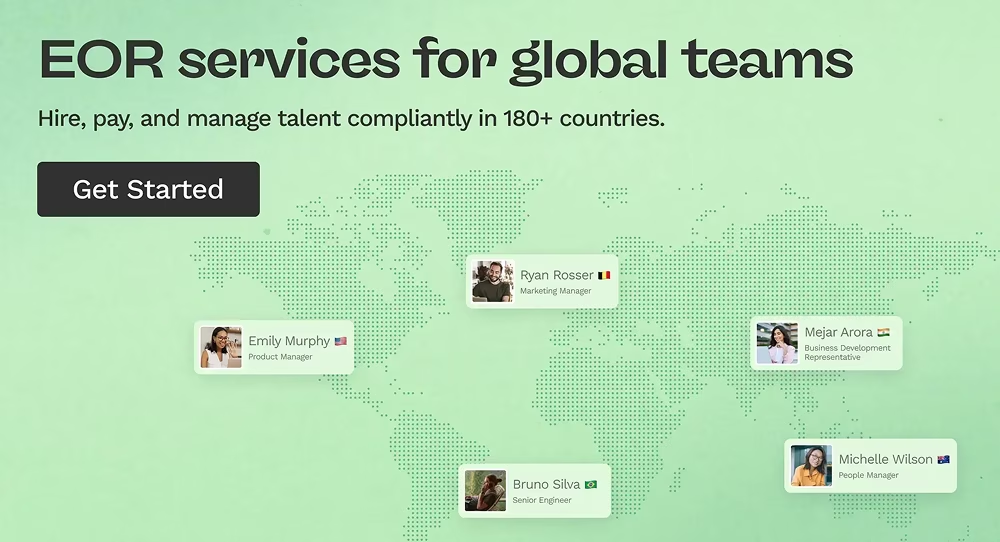Italy is an attractive choice for global hiring, home to skilled professionals across industries and a growing remote work culture. For companies expanding internationally, it’s a smart location to build a distributed team.
But hiring in a new country is often easier said than done. Employers must navigate national employment laws, manage payroll in EUR, provide mandatory employee benefits, and stay current with evolving tax and social security requirements.
Doing all that without a local legal entity in Italy can be challenging. Fortunately, an employer of record (EOR) can help. An EOR allows you to hire employees in Italy without establishing an official presence there. It handles all legal, tax, and HR responsibilities on your behalf, from onboarding and employment contracts to payroll and benefits.
In this guide, we’ll cover the key considerations for hiring in Italy and explain how an employer of record in Italy can simplify the process while keeping your business fully compliant.
4 steps to hire through an EOR in Italy
Hiring in Italy doesn’t require setting up a local entity or managing the country’s labor laws on your own. With the right EOR partner, you can hire employees quickly and compliantly—without the burden of navigating taxes in Italy and other local regulations or administrative overhead.
In short, the EOR takes care of the legal and administrative work while you remain in charge of your employee’s day-to-day work, performance, and growth.
Here’s how the process typically works:
1. Partner with a reputable EOR
Start by selecting an EOR with in-depth knowledge of Italian labor laws, employment contracts, and HR practices. A reliable EOR partner will act as the legal employer of your team members in Italy, take on local compliance regulations, and provide expert guidance on local employment norms and practices—so you can focus on finding and hiring top talent.
2. Provide candidate and compensation details to the EOR
Once you’ve chosen your candidates, the EOR will need basic details like job title, salary, work location (remote or in-office), and any employee benefits you plan to offer. The EOR will use this information to prepare a compliant employment contract that reflects Italian statutory entitlements and aligns with your company’s needs.
3. The EOR drafts and manages the employment contract
Once the EOR drafts the employment contract, it’s time for you to review it. Make sure it includes key terms like the notice period, probationary period, paternity and maternity leave entitlements, and reference to any applicable collective agreements. In Italy, these are called Contratti Collettivi Nazionali di Lavoro (CCNL) or National Collective Bargaining Agreements, and they set mandatory employment standards for specific industries or job roles. A strong EOR partner will understand what new employees in Italy expect and help you offer a competitive compensation package designed to minimize turnover.
4. The EOR handles onboarding, payroll, and compliance
Now that the employee has signed the contract, the EOR can begin the onboarding process. This includes setting up payroll in EUR, withholding income tax (national, municipal, and local), and submitting social security contributions. They’ll also stay up to date with changes to Italian labor laws to keep your business compliant.
A few things to know about hiring in Italy
When it comes to hiring and paying employees in Italy, it's important to understand the legal, financial, and practical considerations that shape local employment. From salary expectations to employee entitlements, here are a few key considerations to keep in mind:
Salary and taxation
In Italy, employees must be paid in EUR, and employers are responsible for withholding the correct amount of income taxes before issuing pay. Italy uses a progressive national income tax system known as Imposta sul Reddito delle Persone Fisiche (IRPEF), with rates ranging from 23% to 43% based on earnings. Additional regional (1.23% to 3.33%) and municipal (up to 0.9%) income taxes may also apply, depending on where in Italy the employee resides.
It’s also customary to provide 13th- and 14th-month salary payments, typically paid in June and December, on top of standard monthly pay. Many salaried employees expect these extra compensation installments, and some collective agreements make them mandatory.
Probation and termination guidelines
Probationary periods in Italy can last up to six months, but the length often depends on the CCNL and the employee’s job level. These agreements set terms for specific sectors or roles and can influence everything from notice periods to compensation. During probation, either party can terminate the employment contract with minimal notice.
After the probation period, termination becomes more regulated. Notice periods vary based on the CCNL and the employee’s seniority. Regardless of how their employment ends, all employees receive Trattamento di Fine Rapporto (TFR), Italy’s mandatory severance pay benefit, which accrues monthly at a rate of 7.4% of the employee’s gross salary.
Working hours and time off
The typical full-time schedule in Italy is 40 hours per week, though actual working hours may vary depending on the CCNL. Overtime is allowed but usually capped at 250 hours per year unless an agreement states otherwise.
Employees have the right to at least four weeks of paid annual leave plus 12 statutory public holidays. Many collective agreements offer additional leave entitlements, which may be based on seniority or industry-specific.
Benefits of using an EOR in Italy
While Italy offers strong talent and strategic value, hiring locally can involve complex legal and administrative requirements. Here’s how an EOR helps you meet those obligations with confidence:
Compliance
Employment laws in Italy are highly detailed and employee-focused. From collective bargaining agreements (CCNLs) to severance pay, tax withholdings, and required benefits, there’s a lot to navigate. A reliable EOR helps you meet all legal requirements, stay up to date with labor law changes, and avoid risks like noncompliance, employee misclassification, and costly fines.
Onboarding
An EOR oversees all aspects of the onboarding process according to Italian standards, including employee documentation, contract setup, and benefits enrollment. Your new employees start on solid legal footing, and you avoid delays that red tape and paperwork gaps often cause.
International payroll
Running payroll in EUR, calculating the correct income tax withholdings, and meeting Italy’s pay schedules can be time-consuming for foreign employers. An EOR takes care of everything, from issuing payslips to submitting taxes in Italy, to ensure that you compensate your employees accurately, on time, and in full compliance with local regulations.
Compensation and benefits management
Italy enforces strict rules around salary, annual leave, pension contributions, and healthcare. An EOR manages employee benefits like maternity and paternity leave, paid vacation, and healthcare entitlements. Many also offer access to supplemental benefits, helping your business attract the best talent and improve the employee experience.
Terminations
Ending an employment contract in Italy requires strict adherence to notice periods, documentation, and severance pay calculations, often outlined by the CCNL. An EOR handles the termination process in line with Italian and EU labor laws, helping protect your business while supporting a fair outcome for the employee.
Considerations when selecting an EOR in Italy
The right EOR makes hiring in Italy easier. You won't need to spend time setting up a costly local legal entity, and you’ll benefit from local expertise throughout the employee lifecycle, from onboarding and payroll to compliance and termination.
Here are a few key factors to keep in mind when choosing EOR options:
Local availability
Not all EORs operate in every country. When searching for an EOR, make sure your chosen provider has an established presence in Italy and understands local employment laws, taxation, and sector-specific requirements. If you’re hiring in multiple countries, a global provider like Oyster offers the advantage of consistent coverage through a single platform.
Services and tools
An effective EOR should do more than manage employment contracts and payroll. Look for a provider that supports onboarding, benefits administration, compliance tracking, and terminations, with an expert-level understanding of Italy’s regional and national labor requirements.
Also consider the EOR’s platform. Does it offer a centralized dashboard where you can manage employee records, view payroll status, and track key compliance milestones? The right tools will save you time and reduce the risk of missed obligations.
Transparent pricing
EOR services vary widely in cost. Ask for transparent pricing and confirm whether support, HR guidance, and compliance updates are included. Since the cost of doing business in Italy is already high, knowing the full pricing model ahead of time helps you avoid surprises and stay on budget.
Hire talent in Italy confidently and compliantly with Oyster
With Oyster’s employer-of-record services, you can hire full-time employees in Italy quickly and compliantly without opening an Italian legal entity. The all-in-one platform makes it easy to manage payroll in EUR, issue compliant contracts, and meet all local labor requirements. Recognized as a category leader by G2, Oyster combines local expertise with global reach so you can grow your team with confidence in 180+ countries, including Italy.
Ready to get started? Use our Italy employment cost calculator and book a demo to learn how Oyster can support your global hiring strategy.

About Oyster
Oyster is a global employment platform designed to enable visionary HR leaders to find, engage, pay, manage, develop, and take care of a thriving distributed workforce. Oyster lets growing companies give valued international team members the experience they deserve, without the usual headaches and expense.
Oyster enables hiring anywhere in the world—with reliable, compliant payroll, and great local benefits and perks.






.avif)


.avif)
.webp)



_Leader_Leader%201%20(2)%20(3).svg)
_Leader_UnitedKingdom_Leader%201%20(1).svg)
_Leader_Europe_Leader%201%20(1).svg)
_Leader_Mid-Market_Leader%201%20(1).svg)
_Leader_Small-Business_Europe_Leader%202%20(2).svg)
_Leader_Small-Business_Leader%201%20(1).svg)
_FastestImplementation_Small-Business_GoLiveTime%201%20(1)%20(1).svg)